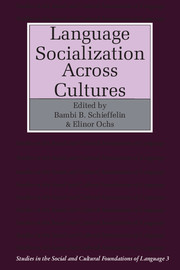Book contents
- Frontmatter
- Contents
- List of contributors
- 1 Introduction
- Part I Acquiring language and culture through interactional routines
- Part II Acquiring knowledge of status and role through language use
- 6 Social norms and lexical acquisition: a study of deictic verbs in Samoan child language
- 7 The acquisition of register variation by Anglo-American children
- Part III Expressing affect: input and acquisition
- Index
6 - Social norms and lexical acquisition: a study of deictic verbs in Samoan child language
Published online by Cambridge University Press: 05 June 2012
- Frontmatter
- Contents
- List of contributors
- 1 Introduction
- Part I Acquiring language and culture through interactional routines
- Part II Acquiring knowledge of status and role through language use
- 6 Social norms and lexical acquisition: a study of deictic verbs in Samoan child language
- 7 The acquisition of register variation by Anglo-American children
- Part III Expressing affect: input and acquisition
- Index
Summary
Introduction
This study documents the spontaneous use of two deictic verbs, sau ‘to come’ and 'aumai ‘to bring/give’, in the speech of young Samoan children. A major goal of this account is to demonstrate that patterns in young children's language production must be assessed not only in terms of grammatical properties, but also in terms of pragmatic properties as evidenced in spontaneous speech. Deictic verbs are viewed here from two perspectives: as forms that refer to or indicate certain semantic relationships between persons and objects in the speech context and as forms that, when used in a particular context, constitute (wholly or partially) social acts interpreted in particular ways by the speech community.
Previous developmental studies of deictic verbs (e.g., E. V. Clark 1978; Gathercole 1978; Keller-Cohen 1973; Macrae 1976; Richards 1976; Tanz 1980) have discussed the function of deictic verbs in English (specifically, “come,” “go,” “bring,” and “take”) in indicating movement relative to persons and objects in the situation of utterance. These analyses view speaker and addressee as having certain semantic roles specified by the utterance, e.g., actor, agent, goal, recipient. The present account focuses not only on the spatial relationships between participants, but also on the social relationships between participants in the situation of utterance and on how these relationships might affect the use of deictic verbs.
- Type
- Chapter
- Information
- Language Socialization across Cultures , pp. 127 - 152Publisher: Cambridge University PressPrint publication year: 1987
- 16
- Cited by



